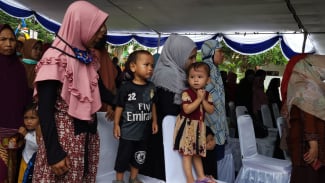Indonesia Must Be Watchful of E Coli Outbreak
VIVAnews – The World Health Organization (WHO) warns that diarrhea can now be fatal. In Germany and several other European countries diarrhea spate has claimed some lives. In Germany, for instance, at least 30 people died. Now thousands of people are infected by this disease. It is also detected in the United States and Canada.
A WHO expert in Indonesia, Dr. Graham Tallis, said that the fatal diarrhea is called harmolytic uraemis syndrome (HUS), caused by Enteroharmorrhagic Escherichia coli (EHEC) bacteria. The bacteria’s serotype is rare, that is E. Coli o104:H4. It is a type of malignant bacteria.
“It causes kidney damage and is a severe complication of EHEC infection,” Dr. Tallis told VIVAnews via email, June 10, 2011.
Despite it occurred in Germany and other European countries, Tallies warned that the plague can threat Indonesia. Infection can happen from those who recently visited the locations of the outbreak, such as Germany. Moreover if they have diarrhea symptom.
A Programme Manager of Disease Surveillance and Epidemiology of WHO Indonesia, Dr. Tallis also explained some preventive actions
What are EHEC and HUS, and how fatal are they to human beings?
Enterohaemorrhagic Escherichia coli (EHEC) is a human pathogenic E. coli bacterium that is able to cause bloody diarrhoea, which sometimes develops into haemolytic uraemic syndrome (HUS). HUS is a life-threatening disease that causes kidney damage and is a severe complication of EHEC infection.
EHEC is so-called Shigatoxin-producing E. coli (STEC), also known as verocytotoxin-producing E. coli (VTEC). Animals can carry other types of STEC/VTEC in their intestines that are not necessarily pathogenic for humans.
Germany and some other European countries are hit by the bacteria. Is the spread of the bacteria detectable?
E. coli is a common bacterium that is found in the intestines of humans and warm-blooded animals. Nevertheless, this particular strain, a rare serotype of EHEC (E. coli O104:H4), is severe, and has caused much illness and some deaths in Germany.
Cases have also occurred in 12 other countries, all of whom had travel links to, or residence in, Germany, except for one case still under investigation.
When can E. Coli outbreak be tackled?
As the source of the outbreak has not been found, it is difficult to say how long it will last.
How are the bacteria transmitted?
The serotype of EHEC, O104:H4, isolated from cases in the EHEC infection outbreak in Germany, is a rare one, seen in humans before but never in an EHEC outbreak.
This has been confirmed by the WHO Collaborating Centre for Reference and Research on Escherichia and Klebsiella, the Statens Serum Institut in Denmark.
Authorities report that the outbreak strain is EHEC serotype O104:H4, or more precisely a strain of enteroaggregative verocytotoxin-producing E. coli (EAggEC VTEC) O104:H4.
The bacteria are transmitted through the faecal/oral route and eating contaminated food is a common vehicle of infection, often through contaminated raw or undercooked ground meat products, raw milk and fresh produce.
Other sources of enterohaemorrhagic E. coli (EHEC) infection are contaminated water, and contact with animals and with other affected patients, if proper infection control is not practised. The incubation period is usually about 48 to 72 hours, but can range from 1–10 days.
Can this outbreak spread to tropical countries like Indonesia?
As mentioned, all cases except for perhaps one appear to have been infected while travelling to Germany. Therefore Indonesians travelling to Germany should take precautions.
In general, measures to prevent enterohaemorrhagic Escherichia coli (EHEC) infection are similar to those recommended for other foodborne diseases, including basic good food-hygiene practice, as described in the WHO five keys to safer food.
What are the preventive actions for the epidemic?
The main advice is to wash one's hands after using the toilet and before consuming food; to wash food thoroughly with clean water, especially if it is consumed raw; and to avoid cross-contamination when preparing food.
Travellers to the area of the outbreak should follow the advice of the local and national authorities. In general, people should adhere to the strictest hygienic measures on food consumption and handling, as described in the WHO five keys to safer food.
How about the people living in the epidemic areas?
People who are in or have had contact with northern Germany recently, and experience diarrhoea symptoms should consult their general practitioners. They should maintain strict hand hygiene, especially if in contact with small children and immunocompromised people.
People with severe or bloody diarrhoea should immediately seek medical care and tell the doctor if they have recently been in Germany. They should not self-medicate for diarrhoea, or use antibiotics, as these could make it worse.
Translated by Indah Lestari

























